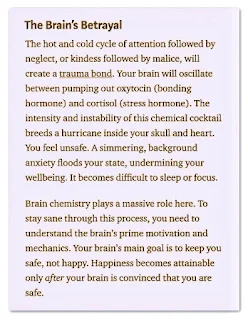Journey Through CPTSD: Navigating Trauma, and Triggers
https://danielryancotlerauthorandpoet.godaddysites.com/
Living with Complex Post-Traumatic Stress Disorder (CPTSD) can be an isolating and harrowing experience. For survivors of narcissistic abuse and intimate partner violence, the journey towards healing is fraught with challenges that extend far beyond physical wounds. CPTSD, a condition stemming from prolonged exposure to traumatic events, manifests in a myriad of ways, impacting every aspect of daily life. From debilitating flashbacks to overwhelming anxiety, the effects of CPTSD are profound and enduring. In the following narrative, we delve into the lived experiences of one individual grappling with CPTSD and the relentless grip of trauma.
When I got to Illinois in mid-December of 2022, I was completely unable to take care of myself in any way, shape, or form. I had tried to go to several places to get help, including drug rehabs. They would turn me away because I hadn't had any drugs in my system for over 30 days. Mental rehab places would not take me either. Despite the evident need for mental health support, I didn't understand it, and neither did they. I resorted to finding drugs, took them, and returned to the drug rehab facility, where they admitted me only to release me after three days. They explained they couldn't help with mental health issues related to methamphetamine use and suggested finding specialized assistance for narcissistic abuse and intimate partner violence.
The next month and a half was a daily struggle for survival. The idea of committing to life felt unbearable. However, around February, I began to make progress. I started talking to people and even made a couple of friends. I remember one evening when they suggested having dinner together. I decided to go to the store to buy ingredients to cook. It had been a long time since I had been in a store or had money to shop, but I had food stamps, so I decided to give it a try.
Within minutes of entering Walmart, I was overwhelmed with panic. Every aisle seemed to trigger memories of my abuser. Seeing his favorite foods brought back painful memories of trying to make things special for him, compensating for the love he never received as a child. One particular moment stands out vividly: passing the soda aisle, I noticed a box of Pellegrino Blood Orange water, his favorite drink. It felt like a direct assault on my senses, plunging me into a state of deep despair.
The store felt crowded, and I became increasingly frightened. I felt like I was in everybody's way, and with each passing shopper, I shrank smaller and smaller into myself, consumed by fear and anxiety. I stood frozen, fighting off tears and struggling to breathe, as panic threatened to consume me.
After what felt like an eternity, an employee approached me and asked if I was okay. Unable to respond, I remained silent, but she sensed my distress. She gently guided me to a quiet space and patiently listened as I struggled to articulate what was happening. With empathy and understanding, she identified my symptoms as complex post-traumatic stress disorder (CPTSD) and shared that she, too, had experienced abuse.
Her kindness and validation provided a moment of solace amidst the chaos of my mind. She helped me gather the items I needed, stood by me in line, and walked me to my car, where I remained frozen for another hour. Her compassion reminded me that living with CPTSD means facing unexpected triggers and experiencing profound vulnerability at any moment.
To this day, leaving my house is a daunting task. I sit in my car for 20-30 minutes before I can even start the engine, paralyzed by fear. Even a trip to the corner store requires immense effort and leaves me frozen with anxiety. This experience is just a fraction of what living with CPTSD entails. Victims of narcissistic abuse and intimate partner violence often face a myriad of challenges beyond what is shared here. From intrusive thoughts and hyper-vigilance to difficulty forming and maintaining relationships, the impact of CPTSD is far-reaching.
Trauma bonds, a phenomenon where survivors develop strong emotional connections with their abusers, further complicates the healing journey. Cognitive dissonance, the psychological discomfort caused by holding conflicting beliefs or values, adds another layer of complexity. These symptoms, alongside the compounding effect of multiple traumatic events, create a tangled web of emotional turmoil that can feel insurmountable.
It's essential to recognize that CPTSD is not a singular experience but rather a complex interplay of various psychological and emotional challenges. Each individual's journey is unique, shaped by their personal history and circumstances. By shedding light on the multifaceted nature of CPTSD, we can foster greater understanding and compassion for those who navigate its treacherous waters.






Comments
Post a Comment
Please leave a comment